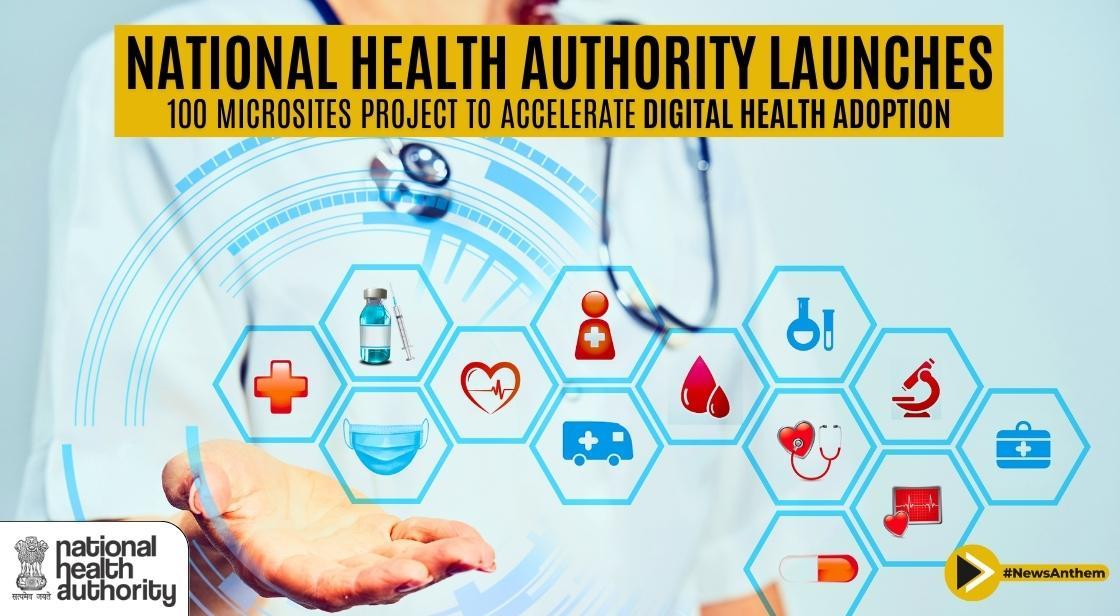National Health Authority Launches 100 Microsites Project to Accelerate Digital Health Adoption

News Synopsis
NHA's Visionary Step Towards Digital Health Adoption
The National Health Authority (NHA) has taken a momentous stride towards transforming healthcare delivery in India by introducing the ambitious 100 Microsites Project. Aligned with the Ayushman Bharat Digital Mission (ABDM), this groundbreaking initiative seeks to promote digital health adoption and improve healthcare accessibility throughout the country.
Empowering Healthcare Facilities through Digital Transformation
The 100 Microsites Project envisions creating a comprehensive ecosystem by clustering small and medium-scale healthcare facilities, including clinics, nursing homes, hospitals, labs, and pharmacies.
All these facilities will be ABDM-enabled and equipped to offer digital health services to patients. These microsites will serve as beacons of progress, facilitating seamless patient journey digitization and ensuring efficient healthcare delivery.
Collaborative Efforts for a Digital Healthcare Landscape
The NHA, in collaboration with State Mission Directors of Ayushman Bharat Digital Mission, will lead the implementation of the 100 Microsites Project across different states and union territories.
Development partners and interfacing agencies will also join hands in setting up and managing these microsites. The NHA will provide crucial financial resources and guidance to ensure the project's success and nationwide impact.
A Holistic Approach to Digital Health Adoption
To achieve complete ABDM adoption in specific geographic areas, healthcare professionals, and facilities, especially from the private sector, will be encouraged to register on ABDM's core registries.
The Healthcare Professionals Registry (HPR) and Health Facility Registry (HFR) will serve as the foundation for streamlined digital health services. With ABDM-enabled applications installed within the microsites, patients visiting these centers will become integral parts of the ABDM ecosystem, linking their health records to their ABHA.
Propelling Private Sector Engagement in Digital Healthcare
The CEO of NHA emphasized the project's primary objective of expanding ABDM's reach among private healthcare providers. By encouraging small and medium-scale healthcare entities to embrace digital health solutions, the project aims to drive adoption within the private sector.
This collaborative effort will strengthen ABDM's foothold in the private healthcare domain, paving the way for widespread digital health transformation in the nation.
Targeted Adoption for Comprehensive Impact
The 100 Microsites Project endeavors to raise awareness among small and medium-scale healthcare providers about the benefits of ABDM. Focused efforts will be made to register these entities on ABDM's core registries and encourage the use of ABDM-certified digital solutions.
The ultimate goal is to create a connected ecosystem where digital health records seamlessly link patient data, fostering a holistic approach to healthcare delivery.
Conclusion:
The National Health Authority's 100 Microsites Project signifies a remarkable stride towards a digitally transformed healthcare landscape in India. By clustering ABDM-enabled healthcare facilities and empowering private healthcare providers to embrace digital solutions, the project aspires to revolutionize patient care and create a seamless patient journey.
This collaborative effort is expected to propel widespread ABDM adoption and pave the way for a more accessible and efficient healthcare system throughout the nation.
Some relevant and latest facts for the above news:
-
The 100 Microsites Project was launched in May 2023.
-
The project is expected to be completed by March 2024.
-
The microsites will be established in all states and union territories in India.
-
The microsites will be implemented by State Mission Directors of Ayushman Bharat Digital Mission, with financial resources and overall guidance from the NHA.
-
The microsites will be clustered around small and medium-scale healthcare facilities.
-
The microsites will be ABDM-enabled, meaning they will be compliant with the Ayushman Bharat Digital Mission's standards.
-
The microsites will help to raise awareness about ABDM and its benefits among small and medium-scale healthcare providers.
-
The microsites will encourage these providers to register on ABDM's core registries, use ABDM-certified digital solutions, and ultimately link digital health records.
-
The 100 Microsites Project is a significant step towards the goal of widespread ABDM adoption in India.
-
The project is expected to make healthcare more accessible and efficient for patients, and it will also help to improve the quality of care.
Here are some additional facts that you may find relevant:
-
The Ayushman Bharat Digital Mission (ABDM) is a national initiative to create a unified digital health infrastructure in India.
-
The ABDM aims to make healthcare more accessible, affordable, and efficient for all Indians.
-
The ABDM has already made significant progress in establishing a digital health infrastructure in India.
-
The 100 Microsites Project is a key part of the ABDM's efforts to accelerate digital health adoption in India.
You May Like









